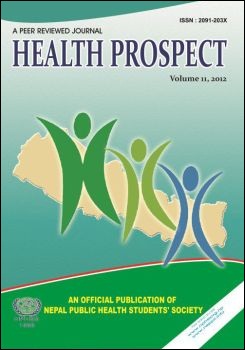Cost-effectiveness of models of care quality for children affected by HIV and AIDS in Nepal
DOI:
https://doi.org/10.3126/hprospect.v11i0.7425Keywords:
Comparative effectiveness, Cost effectiveness, Care models, Children affected by HIV/AIDS, CABA, NepalAbstract
Background: With an estimated sixty four thousand people living with HIV in Nepal, there are tremendous implications for children, whose lives are greatly affected when a parent is infected. The objective of this study is to identify and assess cost effectiveness for existing models of care for children affected with HIV/AIDS
Methods: The study performed cost effective analysis for types of care and support for children affected by HIV and AIDS in Nepal from a societal perspective. Types of care and support to Children affected by HIV/AIDS were assessed, Comparator minimum was estimated based on government minimum standards guideline; comparative analysis for cost effectiveness was done in terms of care quality, and overall modes of care delivery.
Results: This study identified only three types of care model (comprehensive institutional model of care, home based care and support, community based care with income generation) prevalent in Nepal. Out of this three types of models of care: Community based care with income generation was assessed as the most cost effective care model in Nepal.
Conclusion: Community based care with income generation imparted children with better socialization and professional skills. However, continuum of care was often missed by one model, therefore other existing models of child care were also essential to provide care and provision of safety nets for children who fail to reach the care homes should also be considered by the government.
DOI: http://dx.doi.org/10.3126/hprospect.v11i0.7425
Health Prospect 2012;11:19-25




